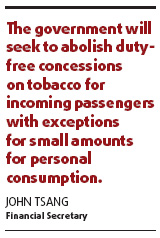More healthcare spending to enhance services
Updated: 2010-02-25 07:34
By Timothy Chui(HK Edition)
|
|||||||
Extra HK$1.24b allocated for medical services, aging population
HONG KONG: The government has pledged additional funding of HK$1.24 billion to the Hospital Authority (HA) to improve medical services and to deal with the challenges and meet the needs of an aging population.
Delivering his budget at the Legislative Council yesterday morning, Financial Secretary John Tsang said, "The number of people aged 65 and over will rise sharply over the next 20 to 30 years. At present, on average, one in every eight persons in Hong Kong is 65 or over. By 2036, it will be one in every four persons."
The additional funding to the HA will be used to strengthen services in six areas. A primary focus is to boost the training of nurses to meet growing demand. About 1,400 nurses will graduate in 2010 and the number will rise to 2,150 in 2012. The government will also provide a total of 2,350 places in nursing programs and training in the next two academic years and 80 places in midwifery training in each of the next four years.
To address citizens' concerns about medication safety, the government will allocate HK$40 million to enhance the regulation of drugs.

The government will also pour more than HK$100 million into mental health spending to train healthcare workers as case managers to provide continuity in mental health treatments, which will benefit 5,000 this year and 16,000 by 2013. About HK$600 million will go to helping chronic patients, setting up community health centers and improving basic dental and oral health services.
Tsang also made mention of the city's medical finance reform and said the government is working out a supplementary healthcare financing option operating on a voluntary participation basis, containing insurance and savings components. He revealed that the government will consult the public on the option this year.
In another move to promote public health, following a 50 percent hike on tobacco duties last year, Tsang hinted the government will seek to abolish duty-free concessions on tobacco for incoming passengers with exceptions for small amounts for personal consumption (no more than 19 cigarettes).
He also said tobacco taxes could be progressively increased to bring the current retail tax ratio on cigarettes of 60 percent closer to the World Health Organization's 75 percent based on recommendations by the Food and Health Bureau.
Medical sector lawmaker Leung Ka-lau called the budget acceptable but was concerned about the vast sums handed to the HA, saying the authority's spending was not transparent enough to ensure public funds were used appropriately.
The money should be used in areas likely to be unaffordable for the ordinary citizen, for example, care for elderly and psychiatric patients who are chronically ill, Leung said.
Despite the additional funds to boost nurse training and graduate output, Leung said pay for university graduate nurses in the public hospitals has to be boosted in order to retain them.
Chairman of the Hong Kong Medical Association Tse hung-hing said Tsang should have added incentives to lure patients of means to use more private sector services to alleviate the overburdened public sector.
(HK Edition 02/25/2010 page2)